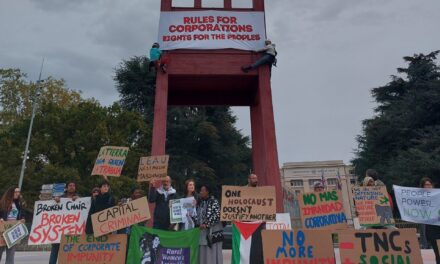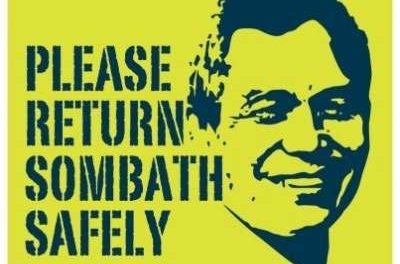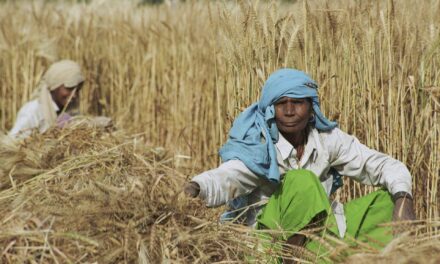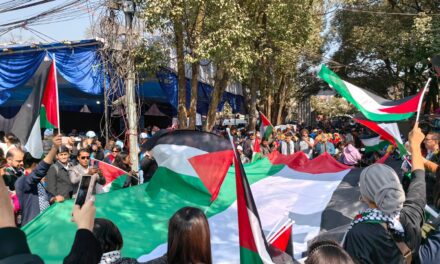by Aditi Bhaduri
Focus on the Global South
originally posted on Frontline-India
LISA TARAKI WAS recently in India to attend a conference on “A Just Peace for Palestine”.
LISA TARAKI is a sociologist at Birzeit University, West Bank, Palestine. In addition to her academic work on aspects of Palestinian society, politics and urban social history, she has been an activist since the late 1970s in the struggle for the right to education in Palestine. She is one of the founders of the Palestinian Campaign for the Academic and Cultural Boycott of Israel (PACBI), established in Ramallah in 2004. Recently in India to attend a conference on “A Just Peace for Palestine”, she spoke to Aditi Bhaduri. Excerpts from the interview:
As an academic, how did you become an activist?
I was born and grew up in Kabul and then in the 1970s went to the U.S. to pursue higher education. I studied sociology, and then married a Palestinian and came to Palestine in 1976. I began teaching at Birzeit University in Ramallah, which is the most famous Palestinian university, and in the early 1980s students’ activism began for the liberation of Palestine. Many of our students were arrested by the Israeli military and classes were closed down several times. So, automatically I got involved in the legal movement to get our students freed from prison. My activism took shape within the framework of defending the university and trying to keep it open.
Israel tried in various ways to hinder education. There was constant surveillance of the university, and even the president of Birzeit University – Hannah Nasser – was deported from Palestine for 19 years. He came back only in 1995 after the PLO [Palestine Liberation Organisation] came back to the West Bank. Nevertheless, these methods only reinforced our determination to carry on. Even when the university would be closed down and teaching was criminalised, we would teach underground and we would quickly regroup and organise whatever courses we could teach in places like churches, mosques, people’s homes. If the closure was for long, we would try and rent out an apartment to continue the classes. And remember, all this was in the days before the Internet. The military controlled the state schools, so we would teach in private schools. Students going to these classes would often be arrested too. This experience was enough to radicalise anyone. Soon after, the first Intifadah began and for four years Birzeit was closed down. But we continued to teach and people graduated.
Did things change in the field of education after the Oslo accords were signed?
The school system changed because then we were able to develop the first Palestinian curriculum even though it was closely monitored by the Israelis. However, after the second Intifadah the right to mobility was so hampered with the entire system of checkpoints that access to universities became difficult for students. So now education in the West Bank has become very “localised”. Earlier, for instance, Birzeit had students from all over the West Bank. So even though it’s a small area, movement is extremely difficult, say, for someone from Bethlehem coming to Birzeit. And I am not even talking about Gaza from where no one can come to the West Bank.
Birzeit pioneered the first women’s studies programme in West Asia.
The first women’s studies programme was established in 1994 in Birzeit University, and we pioneered the first gender studies programme in the whole of the Middle East [West Asia]. It was a brand new area of academic study, and it was very challenging to develop a curriculum. We had to translate key works from English to Arabic as there was nothing in Arabic. It is very popular now and has grown and we have now both graduate and postgraduate courses in the programme.
How did this come about?
I think it has to do with women’s role in Palestine. Women in particular have had to bear a double burden as most of the people arrested by the Israelis have been men though there are a sizable number of women prisoners too. So men prisoners have relied on women to be advocates, to satisfy needs like getting them clothes, food, to raise their children if married. There is not a single Palestinian family which has not had a member in prison.
So one of the things gender studies has looked into is the role that women have played and how women manage and how elastic the social support system in Palestinian society is. The family is considered to be the bedrock of the community but after a while women with their men in prison have had to fend for themselves, their households, and raise children, and the family has proved to be not as elastic as was thought earlier; it has become quite fragile.
Even in the economic system, women were a major force in agriculture, but when agriculture was almost destroyed in the Palestinian territories and men turned into workers, there was a redivision of labour. For instance, olives are the main crop in the West Bank, and that needed labour like ploughing the earth around the trees, which women traditionally had not engaged with but now had to. They had to take on the added burden of harvesting, etc. But, of course, it is not possible to talk about women in general as the position and role of women in Palestinian society is also class-specific and region-specific.
You are involved in the boycott, divestment and sanctions (BDS) campaign against Israel, including academic and cultural boycott.
I got involved in the campaign and movement for boycott, divestment and sanctions against Israel in 2002. It has been eight years, and it’s the boycott movement in Palestine in a new form as we have a long history of engaging in boycott.
Israel’s military incursion into Palestinian territories since the P.A. [Palestinian Authority] was established and especially its attack on the headquarters of President Arafat shocked the world and mobilised people across the world. So a number of us in Ramallah and some colleagues in Britain and Palestinians in the diaspora put together a statement in 2003 as a way to pressure Israel as diplomacy and negotiations were not working. In 2004, we set up the Palestinian Campaign for the Cultural and Academic Boycott of Israel. The same year, the International Court of Justice issued its famous decree which found Israel’s wall built on occupied Palestinian territory to be illegal. This decision gave legitimacy to our campaign and that is when we linked up with academics and cultural organisations in the world, and we have organised groups in Britain, France, Sweden, Italy, last year in Pakistan, and this year in India.
In 2005, we established the BDS world to impose broad boycotts and implement divestment initiatives against Israel, similar to those applied to South Africa in the apartheid era, until Israel meets its obligation to recognise the Palestinian people’s inalienable right to self-determination and fully complies with international law. Our campaign is also internally confronting Palestinians who believe in the bankrupt ideology of peace and dialogue with Israel and who receive millions of dollars.
What do you expect from your visit in India?
We believe the boycott campaign has to be country and context specific. What works in one country may not work in another. So we need a lot of research to know where action will be effective. Recently, for instance, some prominent South Africans issued a statement supported by Desmond Tutu amongst others refusing to cooperate with Ben-Gurion University. At the same time, I want to make it clear that we call for a boycott of institutions and not individuals. So I have been very happy with my trip to India. I have found a lot of support and solidarity from the people. We hope that the work can take place at different levels – at the government, Parliament and, of course, amongst ordinary people. India with its own history of resistance can do much, and it is for Indians to work out how best they can support the BDS movement.









